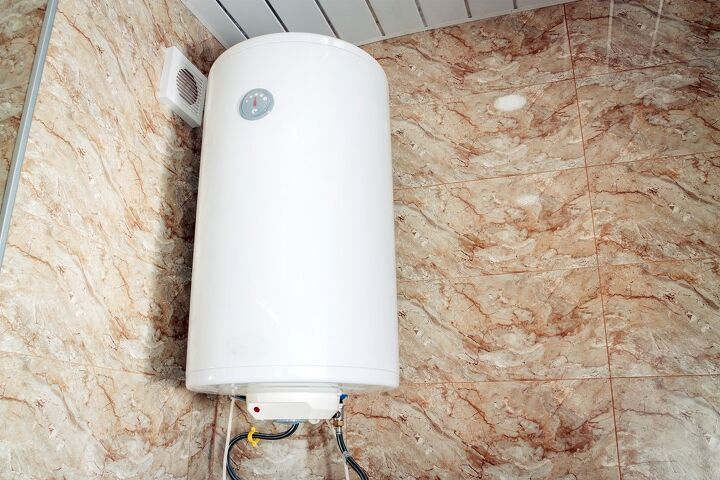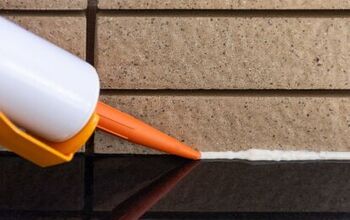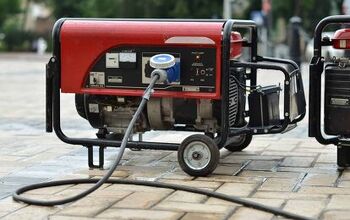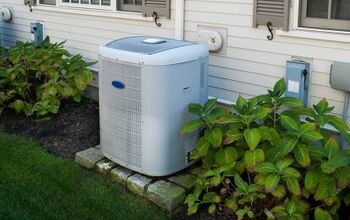Can Water Heaters Explode? (Causes and How to Prevent It!)

We enjoy certain levels of convenience thanks to things like our HVAC system and water heater. Without the latter, we would not have hot water on demand. While that doesn’t sound like the worst thing, it can cause a lot of inconveniences.
But there may come a time where your water heater is not in good shape. It may also get to the point where your water heater is dangerous. Water heaters can, in fact explode and cause serious damage as a result. If you notice standing brown water, a leaking pressure valve, or a smell of rotten eggs, call a technician immediately. Under no circumstances should anyone perform a repair themselves unless they have training in water heater repair. An exploding water heater could be fatal if handled improperly.
Do You Need Water Heater Repair Services?
Get free, zero-commitment quotes from pro contractors near you.

Can Water Heaters Explode?
The short answer is a resounding “yes.” Without proper maintenance, the main culprit will likely be water pressure that is too high. Your water heater is an intricate piece of equipment. If something goes wrong and compromises the tank, that is where the potential for explosion comes into play.
Proper maintenance goes a long way towards not only preventing explosions but extending the life of your water heater as well. Best of all, these measures can be taken by those who aren’t even certified to work on water heaters. The key is to be persistent.
What About Electric Water Heaters
With all the talk about gas leaks, you may be asking yourself if all of this applies to electric water heaters. The resounding answer is that, yes, it is susceptible to all of the same things that a gas water heater is subject to.
Just like a gas water heater, too much pressure in the tank can lead to an explosion. There is also the potential for issues with the T&P valve, brown sediment, or improper installation. Don’t just assume that you don’t have to worry about explosion or it could come back to haunt you big time.
Signs That Your Water Heater May Explode
While it is never a good thing that your water heater may potentially explode, it is at least good that there are warning signs. For the most part, your water heater is not a threat to just randomly explode – unless you ignore the signs.
There are five signs, in particular, that stand out. If you notice any of these, turn off the gas/electricity and get in touch with a certified water heater repair technician. Do not, under any circumstances, attempt to fix the issue on your own. It could be potentially fatal.
1. Brown Water
Brown water is probably the last thing that you want to see. Not only is brown water indicative of a potential explosion, but it can have serious detriments to the health of everyone in the home.
Running water in your home should always be clear. If there is a brown tint to it, it means that there may be some sort of sediment or rust buildup somewhere within your system. More than likely, the buildup is in your pipes.
Consuming any of this contaminated water could have serious health implications. Turn the water heater off if you notice that it is brown in color and call your local repair tech.
2. Leaking Pressure Valve
The pressure valve in your water heater is there for a crucial reason. The pressure valve makes sure that when the water heater is treating the water, there isn’t too much pressure built up inside of the tank.
Safety mechanisms like the pressure valve can have issues of their own, though. When the pressure valve leaks or malfunctions, it can mean a pressure build up in the tank. Leaking of the valve is a good indication that there is too much pressure inside of the tank and an explosion is on the horizon.
Do not attempt to replace the valve on your own. At this point, only a certified technician should attempt a repair with an explosion potentially imminent.
3. Popping Noises
Without proper and regular maintenance, sediment can build up at the bottom of the tank. It is important to have your tank flushed at least twice each year. Sediment build up can be dangerous in more ways than one.
For starters, it can wear down the tank over time. If you get to have too much of a buildup, you may have to replace the tank entirely. In a scenario where air and water get stuck beneath the sediment, it causes more pressure to build up within the tank.
Those popping noises that you hear is the sound of high water pressure. And as we know from above, when there is high pressure in the tank, a potential explosion is right around the corner. Your T&P valve would normally regulate the pressure here. But it could be that the valve has been damaged and no longer effectively stops pressure from building up inside of the tank.
3. Bad Installation
Of all the reasons that your water heater may be ready to explode, this is probably the toughest to spot. Unless you are an expert in water heater installation, you may not notice the signs of an improper installation.
When your water heater has been improperly installed, it can lead to several issues. Things like pressure buildups, gas leaks and other issues that could potentially end in an explosion. Improper installation can be spotted with routine maintenance from a professional.
If you feel like the installation of your water heater was not done the right way, contacting a professional is the best way to go. Even if you do not fear an explosion, having the tank installed properly will ensure that it functions optimally and that you don’t have to fear potential explosions in the future.
5. Smells like Rotten Eggs
While there are a few things that can cause that rotten egg smell (what did you eat?), smelling it in the vicinity of your water heater is a major cause for concern. The rotten egg smell is due to the release of sulfur.
Sulfur being released is an indication of a gas leak. Gas leaks are extremely dangerous. Your water heater requires a pilot light to kick on. When there is excess gas not only in the tank but in the area, it could potentially hit the pilot flame.
Gas leaks are a major concern. Not only can they lead to an explosion but it is dangerous to breathe gas in as well. Gas leaks should be handled by a professional immediately and it is advised that you clear the home until they can get in to address the problem.
What Causes a Water Heater to Explode?
Knowing that your water heater can explode is a good place to start. It was an urban legend until the show Myth Busters performed an experiment to prove that it really can happen. Past that, it is important to know what causes water heaters to explode.
Knowing the causes, as well as the tell-tale signs of an explosion, can help you prevent something dangerous from happening. Here are the reasons why your water heater may be on the verge of an explosion.
1. High Pressure Inside the Heater
Probably the most common reason that water heaters explode is due to excess pressure in the tank. The tanks are only rated to handle so much pressure before the tank can’t take it anymore and explodes.
Unfortunately, too much pressure can impact both electric and gas water heaters. The increased pressure takes place whenever the water inside of the tank gets heated. When the water heats up, it naturally expands, which builds up the pressure inside of the tank.
But high pressure inside of the tank does not happen on its own. There are a few reasons why water pressure can become too high for the tank to handle.
2. Improper or No Maintenance
Maintenance is crucial to the life of your water heater. More importantly, it can potentially prevent issues like explosions from taking place. With age and frequent use, your water heater experiences a buildup of mineral deposits.
That sediment settles itself at the bottom of the water heater tank. This is why draining your tank is imperative. When it goes unchecked, that sediment hardens, eventually corroding things like the inner lining. That weakens the water heater as a whole.
If the tank walls become too weak, it leaves the tank susceptible to explosion even under normal levels of pressure. And when there are normal levels of water pressure, the T&P valve won’t matter because the pressure won’t be high enough to trigger it.
Routine maintenance is necessary for your water heater. Not only will it prevent issues like explosion, but it could potentially double the water heater’s lifespan, too.
3. Temperature & Pressure Relief Valve Fails
There are built-in safety mechanisms meant to prevent issues like this from occurring. Unfortunately, those safety mechanisms can also potentially fail. The temperature and pressure valve (known as the T&P valve) is one of those mechanisms.
When the pressure inside of the tank gets to be too high, the pressure gets released through the T&P valve. Just about any modern water heater will have this feature equipped. If you have an older water heater, however, you may not have the T&P valve.
When the valve gets blocked or outright fails, then there is no way for the pressure to relieve itself. The water heater will eventually hit its pressure limit and explode. Regular maintenance will ensure that safety mechanisms like the T&P valve remain fully functional.
4. High Limit Switch Fails
Another built-in safety mechanism is the high limit switch. It is the red button that typically is located right above the upper thermostat. Without the thermostat and the high limit switch, there is nothing regulating the heating elements. All of which means that the temperatures can rise to potentially unsafe levels.
The high limit switch works by tripping, which cuts the power to the thermostat as well as the heating element. It is typically meant to cut off after hitting 180 degrees, but if it fails, then the temperature will continue to get hotter, heating the water and increasing the temperature all the while.
The good news is that it would take both the T&P valve and the high limit switch to fail simultaneously for an explosion to occur. That said, if your water heater is old, it may not have either of these safety features.
5. Flammable Chemicals in the Area
If you have a propane- or gas-powered water heater, it is never a good idea to keep flammable liquids nearby. If you have an electric water heater, this is not a concern that you have to contend with.
Should a gas leak develop, it can combine with the flammable chemicals to develop a seriously dangerous explosion. An exploding water heater is bad enough, but with flammable chemicals around, it could mean your entire house going up.
Do yourself a favor and keep your flammable chemicals far away from your water heater. It is the easiest method to protect yourself in the event of a potential water heater explosion.
How Realistic is it That Your Water Heater Explodes?
While there are definitely signs that you could be facing an explosion, it begs questioning. How often do water heaters really explode? It feels like if it were all that often, it would be something that we hear about on a fairly regular basis.
The simple fact of the matter is that there are several public stories that happen each year. These are just the instances of something being reported on. There are no doubt a few more that go unreported as well.
Just because we do not hear about them often does not meant that the chances of it happening are low. Have the proper maintenance done and you can do a lot to keep yourself safe from potential danger.
What Can Be Done to Prevent an Exploding Water Heater?
Let’s say that you have noticed one or more of the aforementioned signs. What do you do now? The first thing to do is to cut off the power. That means either cutting off the electricity or the gas lines if you think that an explosion is on the horizon.
The manual for your water heater should have instructions when it comes to turning off the unit safely and completely. When you have done that, do nothing other than call in a professional technician. Unless you have training in water heater repair, this is not an issue that you want to handle yourself.
Fatal incidents involving exploding water heaters have come due to an attempted DIY fix. It is not worth the risk to yourself or your home to attempt a fix on your own. That said, there are a few things that you can do prior to keep an explosion from eventually becoming a possibility.
Take a Look at Your Temperature & Pressure Valve
The T&P valve, short for the temperature and pressure relief valve, is one of the most crucial safety components in your water heater. At a minimum, it should be checked twice per year but most don’t check it at all.
The T&P valve works to ensure that temperatures and water pressure don’t risk to unsafe levels. But without those routine checks, it can become clogged with sediment, which keeps it from opening when necessary.
Some T&P valves may not have a discharge pipe. If yours doesn’t, you will need to have a plumber come out and have one installed. That discharge pipe keeps scalding hot water from coming out of the T&P valve without notice.
Checking the valve is simple. Put a bucket under the discharge pipe and lift the lever open for 5 to 10 seconds. Water should be coming out through the discharge pipe and out into the bucket.
Check the Anode Rod
The anode rod is the sacrificial lamb of water heater components. It attracts all of the corrosive particles that live inside the water heater and basically shields the tank and other components from damage.
The anode rod keeps the inner part of the tank safe from the threat of rust. Rust could weaken your water heater, which could leave it more susceptible to explosion at much lower water pressure.
There are three different types of anode rod: magnesium, zinc, and aluminum. The zinc is meant to keep sulfur smells from getting into the water supply. Magnesium, meanwhile, is the most common anode rod there is. These are best where softer water is most common. They don’t last long where hard water is present. Aluminum, meanwhile, is most resistant to hard water. That said, it can cause health problems and water heaters with aluminum anode rods are not recommended for drinking.
Drain and Flush the Water Heater
One of the leading causes of issues with your water tank is sediment build. When minerals fester in your tank, they will start to form a buildup. Over time, that sediment will have a few harmful impacts.
For starters, the sediment can literally eat away at the tank. If left unchecked over time, it can result in rusting and corrosion. Given enough time, there will be no fixing your water heater. It will need to be replaced. That’s not even mentioning the potential for explosion.
Draining the water from the tank and flashing the entire system is recommended at least once per year. It is simple and should take no more than two hours to do. That will get rid of all the sediment in the tank, keeping it from possible issues in the future.
Lower the Temperature
Every water heater comes equipped with a thermostat. They are located behind a cover panel at the frontmost part of the water heater for electric. Generally speaking, they are set from the factory at 125 degrees F.
The same is true for gas water heaters though the location can vary. It is closer to the control module for gas. When the pilot is lit, the control knob gets turned to the ON setting and the temperature can be set.
The highest temperature is typically around 140 degrees F. That said, it is not advised. Thermostats that are set well above the 125 degree F mark tend to wear down a lot quicker. Not only that, but it could lead to frequent discharge of the T&P valve.
Keep Up with Maintenance
There may be no more important tool for proper water heater care and explosion prevention than maintenance. If you don’t, you should have a water heater maintenance schedule in place.
Having a maintenance schedule ensures that all of the essentials are handled. That means draining and flushing the tank as well as inspection of the T&P valve. There are other maintenance protocols that can be followed. All of which not only help prevent explosions from happening, but also extend the life of your water heater as well.
Install Above Floor Level
This one is a bit tricky as you likely are not reading this before there is an issue. One way to give yourself protection against a potentially exploding water heater is to install 18 inches above floor level. This is not necessarily even possible depending on your situation.
The reason for this installation is because liquids like contact cement, brake cleaner, paint thinner, gasoline, and other potentially flammable materials stored in the area. When those materials are left unsealed, the vapors can potentially get into the control valve and cause an explosion. Vapors stay close to the ground, which means that you can reduce a potential explosion by keeping your water heater off the ground.
What You Should Not Do When it Comes to Exploding Water Heaters
First and foremost, never attempt to fix a water heater that you think may be in danger of exploding. That should be left to a professional who not only understands the dangers but has the knowledge and tools to implement a safe fix.
You should also never put tape over a perforation in your water heater tank. That will only increase the pressure and also the likelihood of an explosion taking place. Do not let your water heater go for more than a year without inspection. Moreover, do not leave known issues unchecked for any period of time.
Finally, do not have someone who is unlicensed perform the repairs. It is not only dangerous for you, but them as well. And who knows what liabilities you may be facing by letting an unlicensed technician do work in your home.
Checking for Gas Leaks
If you have an electric water heater, you can skip this step. But if you have a propane or gas water heater, gas leaks are going to be one of the biggest potential threats that you will face as a homeowner.
A major giveaway that there may be a leak is that rotten egg smell. If you think that you smell rotten eggs, do not hesitate. Shut off the gas or propane and get a licensed plumber on the phone immediately.
Gas leaks are dangerous in a multitude of ways. The threat of explosion is the most obvious. But having a gas leak could lead to poisoning if breathed in for too long. Have any suspected gas leaks inspected as soon as possible to keep all in the home safe.
A Proper Installation
Installation of the water heater plays a major role in how it not only functions but in the shelf life of the unit as well. For most of us, we will move into a home that has an existing water heater. Telling whether or not it was properly installed is difficult from this point.
If you are installing a new water heater, it should be installed by a professional. This will insure that there are no issues, both at the time of installation and going forward. Attempts to install the water heater yourself is only recommended for those who have water heater experience.
Proper installation means having it on an 18” stand in order to protect the ignition source. Should your water heater be installed inside of a garage, there should be some kind of vehicle barrier in place to keep the water heater from hitting the cars.
Do You Need Water Heater Repair Services?
Get free, zero-commitment quotes from pro contractors near you.

Conclusion
Your water heater is one of the most vital components in your home. Without it, you will be faced with cold water only, which can become a major challenge come bathing time. That said, it is much easier to prevent issues from happening rather than deal with them as they arise.
When it comes to a potentially explosive water heater, prevention is especially important. These issues don’t spring up overnight and resolving them is not going to be as quick or as easily, either.
Proper preventative maintenance is not just a suggestion, it is a must. With proper preventative maintenance, you would go a long way towards preventing issues like explosion from potentially occurring.

Ryan Womeldorf has more than a decade of experience writing. He loves to blog about construction, plumbing, and other home topics. Ryan also loves hockey and a lifelong Buffalo sports fan.
More by Ryan Womeldorf



























